Exoplanet Kepler-452b: Closest Earth Twin in Pictures
Kepler-452b: A Possible Earth 2.0

NASA scientists announced the discovery of an Earth-like world, Kepler-452b, on July 23, 2015. Here's a look at that closest Earth twin in pictures. This artist's illustration depicts the surface of the newfound exoplanet Kepler-452b, a planet about 60 percent wider than Earth that lies 1,400 light-years away. Kepler-452b is likely rocky, and it orbits its sunlike star at the same distance Earth orbits the sun. [Read full story.]
Possible Appearance of Kepler-452b Exoplanet
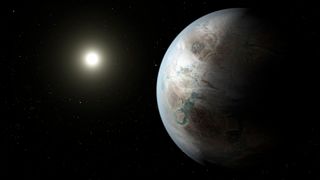
This artist's illustration depicts a possible appearance of the planet Kepler-452b, the first near-Earth-size world discovered in the habitable zone of star similar to our sun. Image released July 23, 2015. [Read full story.]
Kepler-452 System Diagram
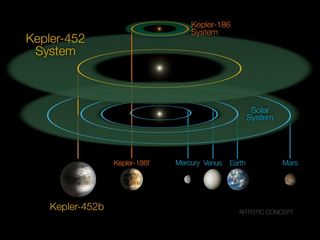
This diagram compares the size and scale of the Kepler-452 system to the Kepler-186 system and the solar system. Image released July 23, 2015. [Read full story.]
Kepler-452b Exoplanet Window into Time
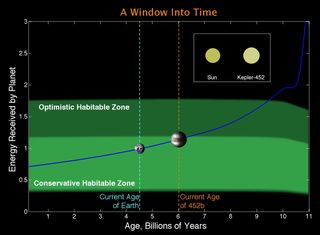
Kepler-452b exoplanet's size, 60 percent bigger than Earth, provides additional protection from the runaway greenhouse effect for another 500 million years. Image released July 23, 2015. [Read full story.]
Kepler's Search for Habitable Worlds
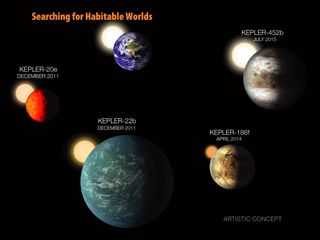
This artist's illustration shows the scope of NASA Kepler mission's search for small, habitable planets in the past 6 years. Image released July 23, 2015. [Read full story.]
Kepler's Small Habitable Zone Planets
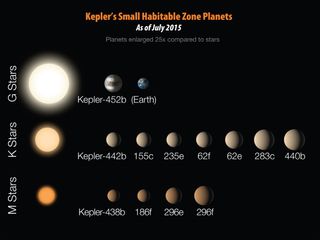
This chart shows 12 exoplanet discoveries made by Kepler that measure less than twice the size of Earth and reside in the habitable zone of their host star. Image released July 23, 2015. [Read full story.]
Exoplanet Missions
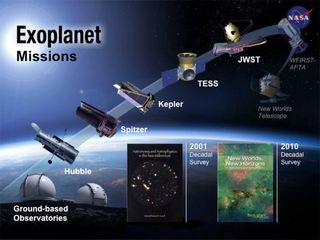
This illustration depicts NASA exoplanet hunting missions of past and future. Image released July 23, 2015. [Read full story.]
Get the Space.com Newsletter
Breaking space news, the latest updates on rocket launches, skywatching events and more!
Kepler Habitable Zone Planets
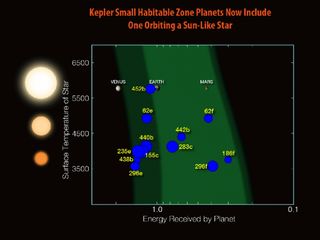
This graph plots Kepler small habitable zone planets relative to the temperature of their star, and with respect to the amount of energy received from their star in their orbit in Earth units. Image released July 23, 2015. [Read full story.]
New Kepler Planet Candidates
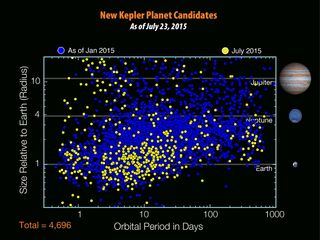
This graph plots the 4,696 planet candidates now known with the release of the seventh Kepler planet candidate catalog, representing an increase of 521 since the release of the previous catalog in January 2015. Image released July 23, 2015. [Read full story.]
12 New Small Kepler Candidates in the Habitable Zone
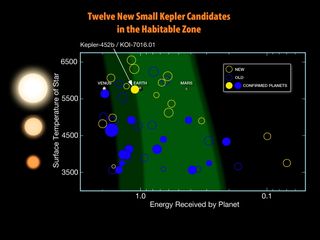
This graph highlights 12 new planet candidates from the seventh Kepler planet candidate catalog measuring less than twice the size of Earth and orbit in the stars' habitable zones. Image released July 23, 2015.[Read full story.]
Assessment of Entire Kepler Dataset
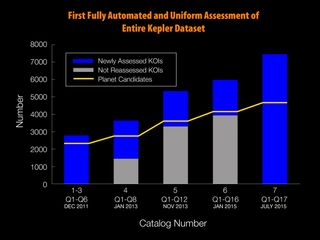
This graph shows how new automated procedures employed in the seventh Kepler candidate catalog allowed all Kepler Objects of Interest (KOIs) could be assessed. Image released July 23, 2015. [Read full story.]
Join our Space Forums to keep talking space on the latest missions, night sky and more! And if you have a news tip, correction or comment, let us know at: community@space.com.

Space.com is the premier source of space exploration, innovation and astronomy news, chronicling (and celebrating) humanity's ongoing expansion across the final frontier. Originally founded in 1999, Space.com is, and always has been, the passion of writers and editors who are space fans and also trained journalists. Our current news team consists of Editor-in-Chief Tariq Malik; Editor Hanneke Weitering, Senior Space Writer Mike Wall; Senior Writer Meghan Bartels; Senior Writer Chelsea Gohd, Senior Writer Tereza Pultarova and Staff Writer Alexander Cox, focusing on e-commerce. Senior Producer Steve Spaleta oversees our space videos, with Diana Whitcroft as our Social Media Editor.
Most Popular
